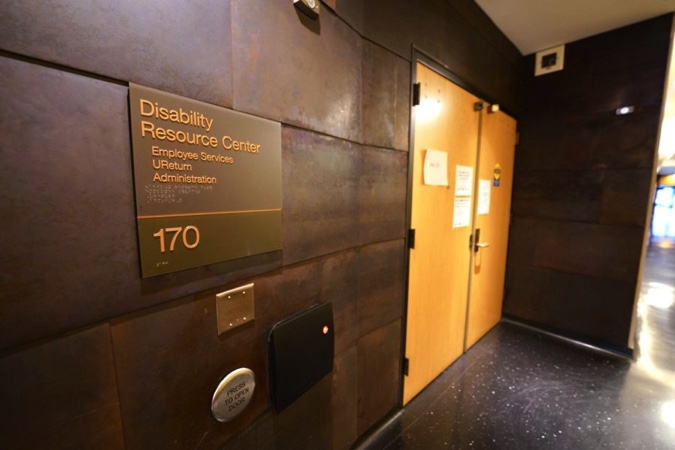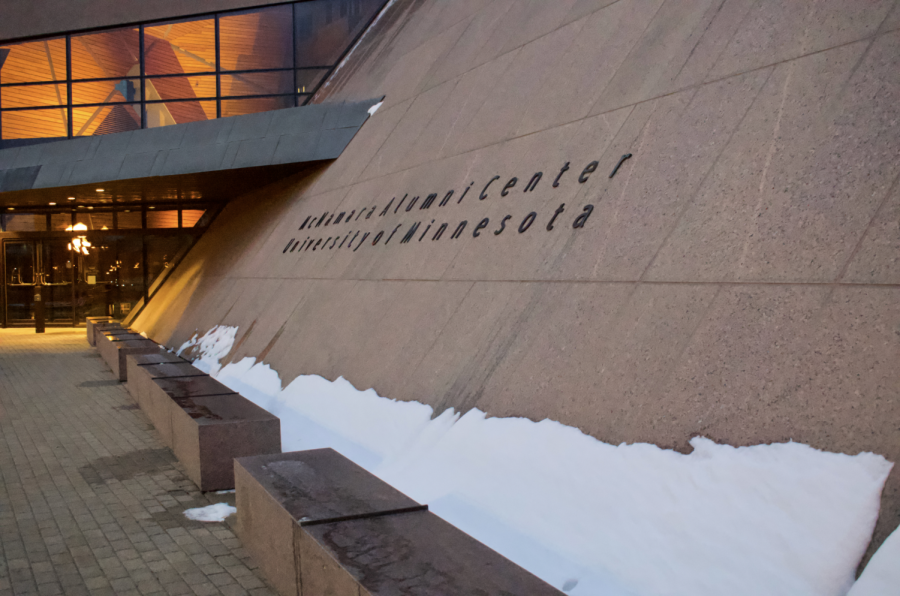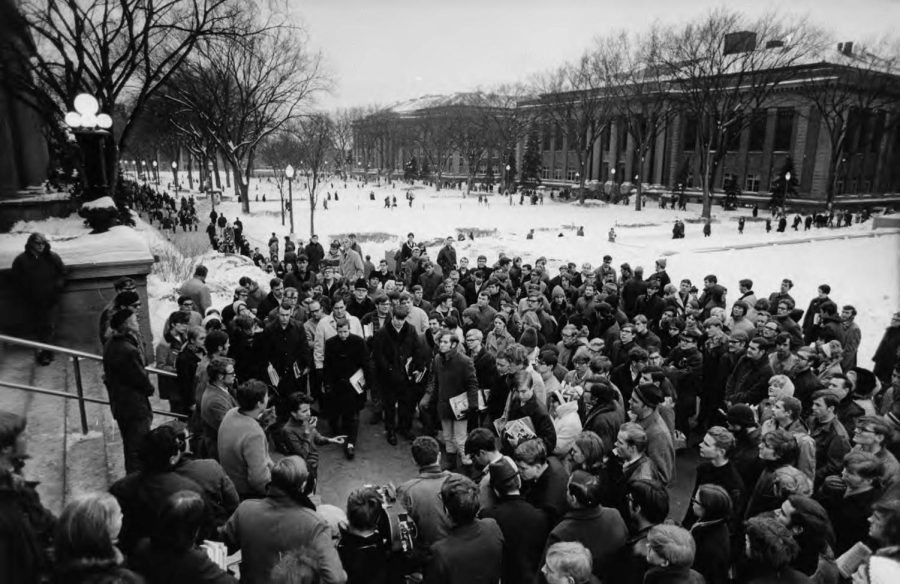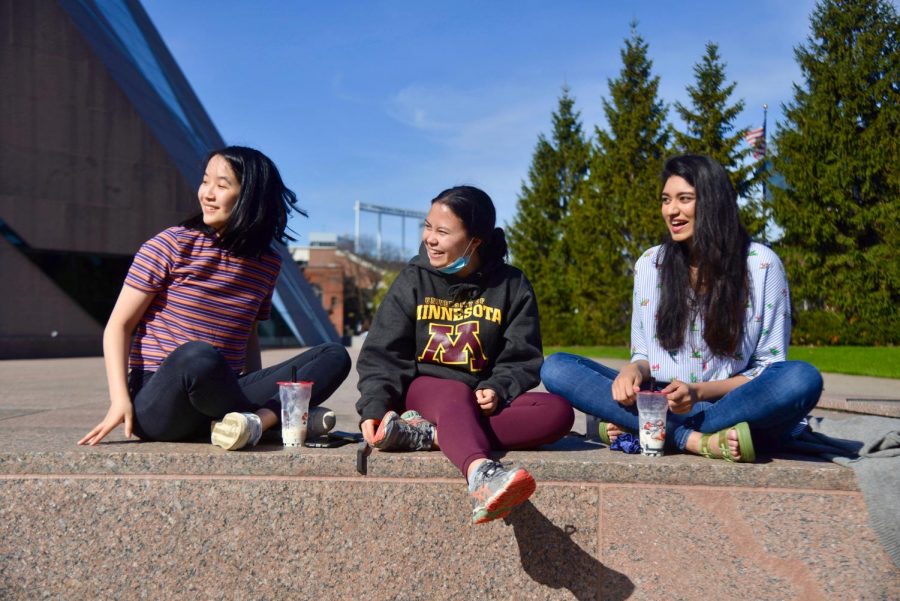After giving his personal information to a recruiter at the University of Minnesota, recent graduate John* trained for months to become a salesman for Southwestern Advantage. But after arriving in Ohio to begin selling for the company in 2016, he started questioning the decision.
“They admire this discipline of working 90 hours a week. It was such a cutthroat, competitive, run-you-into-the-ground summer,” said John, who requested anonymity because he fears backlash from the company.
Southwestern Advantage teaches college students to build their own business by selling books and advertises earning over $8,000 a summer. The company uses a direct sales method where those involved sell books from a parent company and earn profits depending on their sales. Students are not required to buy books to sell up front but are responsible for travel and living expenses.
After the company began recruiting this semester on the Twin Cities campus, students have raised concerns over their business model and methods of recruitment, which include visiting classrooms and renting tables at prominent buildings like Coffman Union.
The University sent a letter to Southwestern Advantage last week saying if they “receive further reports of deceptive marketing tactics or interruptions in classroom spaces, we will be forced to consider limiting your access to campus.”
Southwestern Advantage has worked with students at the University for decades, according to Senior District Sales Leader AJ Skalsky.
“We try to be very transparent and do everything by the book of what they teach us to do. They are very aware of our presence on campus,” he said.
Students, faculty concerned with on-campus recruitment
Concerns about the company stem from student complaints regarding misleading marketing and “sketchy encounters” with representatives, according to the letter sent to Southwestern Advantage on Friday by Maggie Towle, interim vice provost for student affairs and dean of students.
Recruiters for Southwestern Advantage focus on the value of the program’s work experience and the amount of money a student can make, but some students are left wondering what the company does until they attend an information session.
“They were super vague about what it was and wouldn’t give any details besides that it was very competitive,” said University psychology student Bailey Stolz, who had recruiters visit her class this semester. “I didn’t even realize what it was until I saw it on [social media] later.”
The University letter says Southwestern Advantage has also been “falsely indicating a working relationship with Career Services” while recruiting in classrooms, something the company has previously been reminded not to do by the University.
While the company is not banned at the University, they’re unable to recruit in classrooms and career events or use the University’s job board GoldPASS, the letter said. They can request to rent tables, but Student Unions and Activities leadership must review the request, said SUA Communications Director Steve Henneberry.
University senior John Bilbao said Southwestern Advantage shouldn’t be allowed on campus. He urged others to write in to SUA soon after Southwestern Advantage began renting tables in February.
“I think it’s kind of an abdication of responsibility. This is a learning environment, but there are certain predatory things that have been circulating through campus as long as I’ve been here,” he said.
For Caroline Pavlecic, a sophomore and at-large representative for the Minnesota Student Association, the recent attention on Southwestern Advantage pushed her to start drafting a resolution addressing direct sales and multi-level marketing companies on campus.
While still a work in progress, the draft calls for the University to educate students and instructors on the topic.
“I would like for … students and faculty to become a lot more aware of these companies and how they operate. Whether or not a ban [on these companies] is feasible, we have to determine that through consultation with the University,” Pavlecic said.
Work after University recruitment
After multiple interviews, those selected for the program travel to the company’s headquarters in Nashville for a week of training. They then move to another town, frequently in a different state, to sell educational books door-to-door for the summer.
A typical work week for Southwestern Advantage employees is Monday through Saturday, beginning at 8 a.m. and ending at 9 p.m., according to three-time seller Barron Marschall.
“[My recruiter] would drop me off in the morning and pick me up on his way back home,” Marschall said. “I just packed a lunch and got a bike. It was tough … but you get used to the challenges.”
Marschall earned around $6,000 each summer for his first two years, a number he said is below average. He has also recruited several friends.
When recent graduate John* was struggling in the program, he said he had a hard time discussing concerns with his managers after they told him to focus on the positives of his situation. When he began selling, he said he felt like he was taking advantage of people.
“Our sales tactics just seemed so predatory. The company sold me on investing in children and their future, but it doesn’t seem like they care about any of those things,” he said.
He eventually left the program after five weeks of selling without telling anyone, where he calculated he made around $2 an hour.
“An hour after I left, my manager and my manager’s boss chewed me out over the phone for not being driven enough. They told me if I didn’t turn around, I was making the biggest mistake I would ever make,” he said.
Skalsky, who oversees multiple states in the Midwest, said many of the company’s critics are people who don’t fully understand the program.
“People that either quit or have never done our program have a tendency to … go online to try and make us look bad, because it validates why they quit,” Skalsky said. “People oftentimes don’t want to take responsibility for themselves.”
Skalsky sold for Southwestern Advantage for nine summers and met his wife through the company. For him, the program turned his life around.
“The reason why I continue doing this is because I believe every single person deserves opportunity to learn about it. And from the right kid, it’s going to change their life. They’re going to see what their full potential is,” Skalsky said.
Complex business models concern some, encourage others
While commonly labeled a pyramid scheme or multi-level marketing company online, Southwestern Advantage President Dan Moore said the company uses a direct sales model, which helps college students develop their own businesses.
“The model is that people are independent businessmen. They buy products from their company at a wholesale price, and then they resell those products to customers at a retail price. It’s just like any business,” Moore said.
Sellers who later recruit others receive what Skalsky calls a “dealer discount” from the company, which pays the recruiter depending on how well their recruitee does instead of the number of people hired.
Robert FitzPatrick, an expert in multi-level marketing schemes, pyramid schemes and direct selling, said the company’s model of bringing students to sell in a different state puts them in a vulnerable position.
“You’re picked up, taken away from your home turf, away from friends and family. There’s nothing else to do but keep working. They can impose all sorts of psychological pressure on you … because you’re physically stuck,” FitzPatrick said.
Skalsky said that while students who drop out of the program he oversees may face money problems or other trouble, he has always made sure they make their way home, even if it means paying for their plane or bus ticket himself.
“I always try and leave students in a good place, [even if] they didn’t finish the summer. I have the utmost respect for anybody who tries our program,” Skalsky said.
While Southwestern Advantage has plans to recruit throughout the semester, their presence on campus still raises questions for students and faculty.
“The whole idea of going to college is that it’s a somewhat protected space,” FitzPatrick said. “[Colleges] should, at the very least, be forcing these companies to make it a real choice for a student and not something they get misled by.”
*This University student requested to use another name for fear of backlash from the company.




















